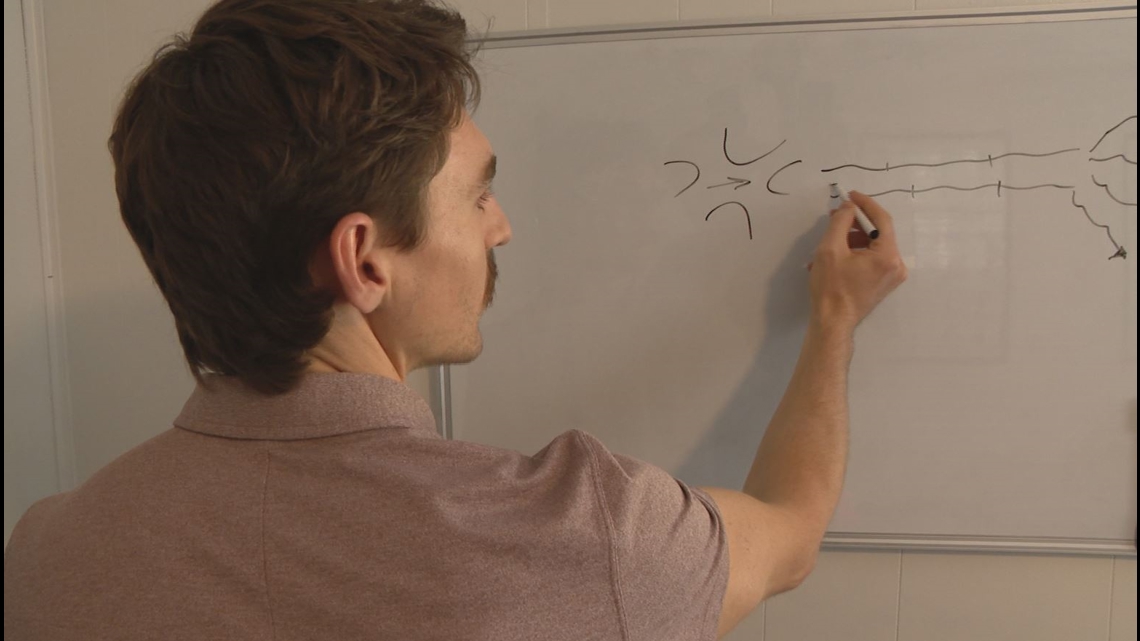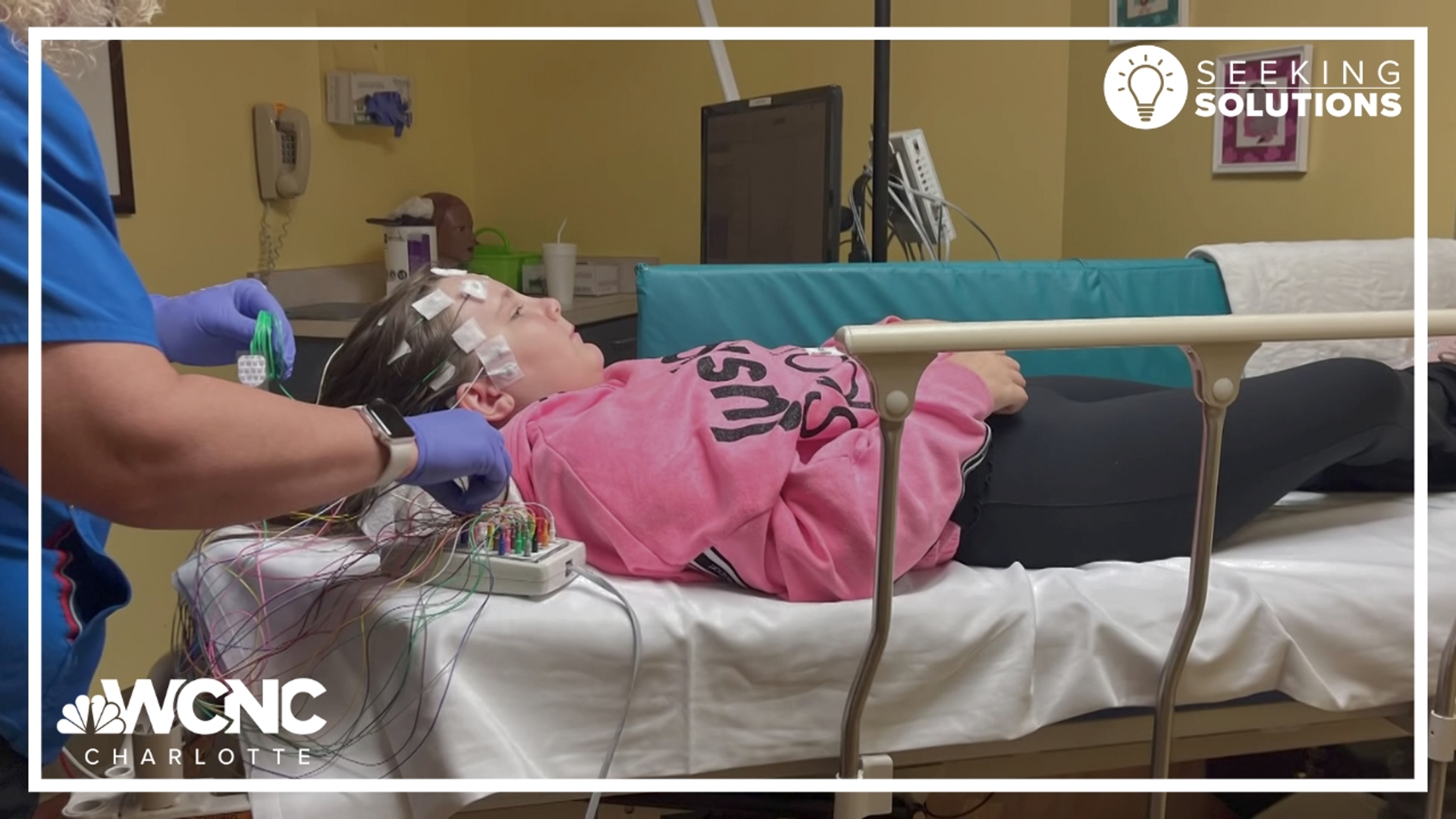CHARLOTTE, N.C. — At just 11 years old, Hope Wiley has already suffered multiple head injuries during recess at two different schools. The Charlotte-Mecklenburg Schools student said she continues living with the impact.
"I used to hang out in the sun all the time," Wiley told WCNC Charlotte. "The nice, bright, amazing sun, but now I can't do that, because it will hurt my head. I used to be able to listen to really loud, loud music and now I can't. I can't do gymnastics, dance, cheerleading. I can't do anything like that."
Just how common are concussions and in which sports?
Wiley is one of an estimated 2.3 million kids across the country, at the least, diagnosed with a brain injury or concussion, but the problem is likely far worse due to underreporting or kids not even being diagnosed in the first place.
A WCNC Charlotte investigation found a failure by schools to consistently track concussions on the playground, in the gym and on the field, making it impossible to fully understand how often kids are getting hurt, which sports they're playing, and if efforts to keep them safe are actually working.
"We really need to improve our collection of these events and our capture, so that we can get these data out to organizations and members of the sport community who need these data to take action," National Center for Catastrophic Sport Injury Research Director Kristen Kucera, PhD said. "If we're to determine if efforts or rules or measures have been taken and have been effective in reducing the outcomes we're interested in impacting, having that data is really important."
Kucera, an exercise and sports science associate professor at UNC-Chapel Hill, is part of a state work group that, among other things, has suggested figuring out "the feasibility" of a formal reporting system for "catastrophic events and concussions" in schools and youth sports. The Catastrophic Sports Injury & Illness Prevention Workgroup, which is primarily focused on sports-related fatalities and disabilities, is a partnership between Kucera's research center at UNC and the North Carolina Division of Public Health's Injury and Violence Prevention Branch.
"That's the purpose of public health surveillance, to understand the scope of the problem and then help us determine if measures taken have been effective at reducing those events or outcomes that we're interested in," Kucera said. "We want kids to be active. We want our young people to be participating in sports and physical activity and so, we want to do everything we can to ensure that they can participate in these events and participate safely."


She points to at least a handful of states that already require concussion data reporting. North Carolina does not. Most of the area school districts WCNC Charlotte surveyed are not tracking concussion data, including Fort Mill Schools District, Iredell-Statesville Schools, Cabarrus County Schools, Union County Public Schools and Charlotte-Mecklenburg Schools.
Different districts, different data
CMS used to collect concussion data for athletes, previously identifying more than 200 concussions every year, on average. At one time, CMS even broke down the numbers by sport before stopping the practice in 2017 without any explanation. The school system also does not track head injuries suffered by kids in places like the gym, the playground and the classroom.
"We take student health and safety seriously in our school district of 141,000 students," CMS Chief Communications Officer Shanna Spickard, Ed.D. said. "While we do not currently maintain centralized data on concussions, we have protocols in place for suspected head injuries. If we suspect a concussion, students are referred to qualified medical professionals who would complete concussion protocols. Additionally, our athletic trainers provide assessment following sports-related injuries. It's important to note that specific data collection for CMS athletes is managed directly by our trainers at Atrium."
Atrium Health provides athletic training services to several area school districts. An Atrium Health spokesperson told WCNC Charlotte, if asked by a school district or athletic team for "anonymized, aggregated reports, for example, we may be able to do so, but only directly to them." Lincoln County Schools, which partners with Atrium Health, provided WCNC Charlotte with a breakdown of 42 concussions documented during the 2023-24 school year by sport, school and date.
Gaston County Schools shared concussion numbers for last school year, obtained through CaroMont Health. The district identified 74 student-athletes sent to a family doctor for evaluation with 26 of those following up with their physician before being cleared to begin return to play concussion protocol. However, the district's data did not identify the child's school or sport. Union County Public Schools, meanwhile, said Atrium Health stopped tracking concussion data for the district during the pandemic.
The North Carolina High School Athletic Association requires athletes who sustain concussions to complete a return to play form, signed by their health care provider and parent, "that acknowledges completion of the return to play protocol [without] return of symptoms and gives consent to return to full participation." NCHSAA Health, Safety and Wellness Director Janna Fonseca said she believes it would be "a great thing" to start tracking concussions, if feasible.
"As of right now, we don't have any mandates requiring concussion tracking," Fonseca told WCNC Charlotte. "There are certain barriers: manpower, time, standard, software. I think it would be a great thing to start doing, but I think right now the fact it's not mandated by the law is probably the biggest barrier."
What is a concussion?
Chiropractic Physician Matheau Denner said early intervention, time to fully recover and detailed communication are critical when it comes to concussions. He said parents, school nurses, athletic trainers and doctors all play a role in helping individual students.
"We want to make the most educated decision," Denner said. "The main thing is looking at how many concussions a child has sustained in a period of time. What we don't want is someone to have a concussion and go back too soon, so we want to make sure we're doing a really good job of letting everyone know where they are in the stages of their treatment."


Denner's clinic is one of a handful in the region with Complete Concussion Management Certification, which connects care networks and improves concussion tracking and treatment, he said.
"Early intervention, we know from the evidence coming out now, is the best way to prevent post-concussion syndrome," Denner added. "What we know is, once they recover fully, they're at a very safe spot to go back and play."
Put simply, Denner said a concussion is diagnosed when someone gets one or more symptoms after enough force causes an impact and changes the brain's chemistry, making a person "feel off or different than your baseline." Symptoms can include headache, dizziness, loss of consciousness and blurred vision, among other things.
"We more than deserve to know"
It didn't take a sport for Hope Wiley to suffer multiple head injuries during outdoor recess at school. Medical records show she's suffered from post-concussion syndrome.
"It didn't really feel good at all," Hope said of the pain.
"How does that make you feel today?" WCNC Charlotte asked.
"Kind of sad," she replied.


Her mother, "horribly sad" about her daughter's repeated injuries, can't help but wonder how many other kids are getting head injuries at school.
"We more than deserve to know," Ashley Wiley said. "We have that right."
Wake County Public School System is the largest district in the state, with CMS a close second. That school system does track sports concussions.
A report provided to WCNC Charlotte shows Wake County documented 46 middle school concussions last school year. Most of those concussions were tied to football, according to the district's data. While the school system tracks middle school concussion data internally, high school statistics are monitored by a third-party management system. A Wake County spokesperson said the district intends to share a report with WCNC Charlotte once it's received and student information is redacted.
Contact Nate Morabito at nmorabito@wcnc.com and follow him on Facebook, X and Instagram.

